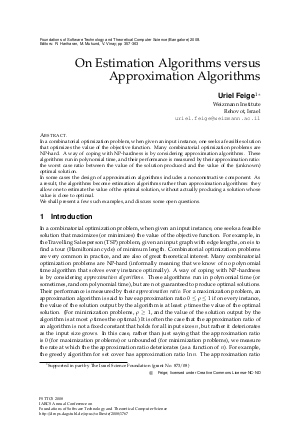On Estimation Algorithms vs Approximation Algorithms
Author Uriel Feige
-
Part of:
Volume:
IARCS Annual Conference on Foundations of Software Technology and Theoretical Computer Science (FSTTCS 2008)
Part of: Series: Leibniz International Proceedings in Informatics (LIPIcs)
Part of: Conference: IARCS Annual Conference on Foundations of Software Technology and Theoretical Computer Science (FSTTCS) - License:
 Creative Commons Attribution-NonCommercial-NoDerivs 3.0 Unported license
Creative Commons Attribution-NonCommercial-NoDerivs 3.0 Unported license
- Publication Date: 2008-12-05
File

PDF
LIPIcs.FSTTCS.2008.1767.pdf
- Filesize: 448 kB
- 7 pages
Document Identifiers
Subject Classification
Keywords
- Estimation Algorithms
- Approximation Algorithms
- Combinatorial Optimization
Metrics
- Access Statistics
-
Total Accesses (updated on a weekly basis)
0Document
0Metadata
Abstract
In a combinatorial optimization problem, when given an input instance, one seeks a feasible solution that optimizes the value of the objective function. Many combinatorial optimization problems are NP-hard. A way of coping with NP-hardness is by considering approximation algorithms. These algorithms run in polynomial time, and their performance is measured by their approximation ratio: the worst case ratio between the value of the solution produced and the value of the (unknown) optimal solution. In some cases the design of approximation algorithms includes a nonconstructive component. As a result, the algorithms become estimation algorithms rather than approximation algorithms: they allow one to estimate the value of the optimal solution, without actually producing a solution whose value is close to optimal. We shall present a few such examples, and discuss some open questions.
Cite As Get BibTex
Uriel Feige. On Estimation Algorithms vs Approximation Algorithms. In IARCS Annual Conference on Foundations of Software Technology and Theoretical Computer Science. Leibniz International Proceedings in Informatics (LIPIcs), Volume 2, pp. 357-363, Schloss Dagstuhl – Leibniz-Zentrum für Informatik (2008)
https://doi.org/10.4230/LIPIcs.FSTTCS.2008.1767
BibTex
@InProceedings{feige:LIPIcs.FSTTCS.2008.1767,
author = {Feige, Uriel},
title = {{On Estimation Algorithms vs Approximation Algorithms}},
booktitle = {IARCS Annual Conference on Foundations of Software Technology and Theoretical Computer Science},
pages = {357--363},
series = {Leibniz International Proceedings in Informatics (LIPIcs)},
ISBN = {978-3-939897-08-8},
ISSN = {1868-8969},
year = {2008},
volume = {2},
editor = {Hariharan, Ramesh and Mukund, Madhavan and Vinay, V},
publisher = {Schloss Dagstuhl -- Leibniz-Zentrum f{\"u}r Informatik},
address = {Dagstuhl, Germany},
URL = {https://drops.dagstuhl.de/entities/document/10.4230/LIPIcs.FSTTCS.2008.1767},
URN = {urn:nbn:de:0030-drops-17676},
doi = {10.4230/LIPIcs.FSTTCS.2008.1767},
annote = {Keywords: Estimation Algorithms, Approximation Algorithms, Combinatorial Optimization}
}
